How Is Ping Deduplexed?
Preface
A few days back, one of my friends asked an interesting question - How is ping deduplexed by Linux kernel network stack? In other words, when a Linux machine receives the ping reply, how does it know which socket to send to?
Compared to TCP and UDP, which are uniquely identified by a port number, ICMP seems to be stateless. After a short discussion, we believe that it is the id field in ICMP header that acts as the identifier. But what if on the same machine, at the same time, two processes ping with the same id, what will Linux do when receiving the replies? To answer this, I read the Linux kernel code as well as ping code in iputils. I also did some interesting experiments.
ICMP
Internet Control Message Protocol (ICMP) is used by the famous ping tool to detect the reachability of the other host. When we say “Can you ping google?”, we actually mean, “When you send an ICMP echo request to google, can you receive a ICMP echo reply back?”.
ICMP message can have many types, for the purpose of this article, let’s only focus on the echo and echo reply message, which both have the following format:
From RFC 792
1
2
3
4
5
6
7
8
9
10
11
12
13
14
15
16
17
18
19
20
21
22
23
24
25
26
27
28
29
30
31
32
33
34
35
36
37
38
39
IP Fields:
Addresses
The address of the source in an echo message will be the
destination of the echo reply message. To form an echo reply
message, the source and destination addresses are simply reversed,
the type code changed to 0, and the checksum recomputed.
ICMP Fields:
Type
8 for echo message;
0 for echo reply message.
Code
0
Checksum
The checksum is the 16-bit ones's complement of the one's
complement sum of the ICMP message starting with the ICMP Type.
For computing the checksum , the checksum field should be zero.
If the total length is odd, the received data is padded with one
octet of zeros for computing the checksum. This checksum may be
replaced in the future.
Identifier
If code = 0, an identifier to aid in matching echos and replies,
may be zero.
Sequence Number
If code = 0, a sequence number to aid in matching echos and
replies, may be zero.
Note: Though ICMP header is inside IP header, ICMP is considered as a Layer 3 protocol.
As we can see from above description, identifier and sequence number together can be used to match request and reply. But what if two packets come with the same identifier and sequence number? RFC doesn’t say anything about this situation, which means we have to look at the implementation.
Ping
The source code of ping in iputils can be found here.
Part of the question asked by my friend is, what if you have two ping process sending two ICMP echo requests with the same identifier at the same time? By reading ping source code, we will know that the short answer is, that’s impossible.
ping4_send_probe is called to send ICMP echo request messages:
1
2
3
4
5
6
7
8
9
10
11
12
13
14
int ping4_send_probe(socket_st *sock, void *packet, unsigned packet_size)
{
struct icmphdr *icp;
int cc;
int i;
icp = (struct icmphdr *)packet;
icp->type = ICMP_ECHO;
icp->code = 0;
icp->checksum = 0;
icp->un.echo.sequence = htons(ntransmitted+1);
icp->un.echo.id = ident; /* ID */
...
}
This function set the id field of the ICMP header to ident. This variable is set to the ping process’s id when it starts. This can be found in setup() function in ping_common.c.
1
2
3
4
5
6
7
void setup(socket_st *sock)
{
...
if (sock->socktype == SOCK_RAW)
ident = htons(getpid() & 0xFFFF);
...
}
Now we know that there is no way to send two ICMP echo request with the same id by using ping. In this case, the unique identifier can be used as the “port” of ICMP. The sequence number is increased by 1 each time an ICMP echo request is sent. When you run ping -c 10 google.com, all 10 ICMP messages have the same id but increasing sequence number.
You may still ask, though two ping processes always have different ids, what if I write my own ping program which can use identical ids? In this case, can the kernel delivers the message to the right socket? To answer that, let’s dive into Linux kernel code.
Linux Kernel Ping
Function icmp_rcv() in file /net/ipv4/icmp.c is called to handle incoming ICMP packets.
1
2
3
4
5
6
int icmp_rcv(struct sk_buff *skb)
{
...
success = icmp_pointers[icmph->type].handler(skb);
...
}
icmp_recv depends on a list of handlers to handle ICMP packets of different types. And it’s definition is shown below:
1
2
3
4
5
6
static const struct icmp_control icmp_pointers[NR_ICMP_TYPES + 1] = {
[ICMP_ECHOREPLY] = {
.handler = ping_rcv,
},
...
}
The handler used to handle ICMP_ECHOREPLY is ping_recv in file /net/ipv4/ping.c.
1
2
3
4
5
6
7
8
9
10
11
12
13
14
15
16
17
18
19
20
21
22
23
24
25
26
27
28
bool ping_rcv(struct sk_buff *skb)
{
struct sock *sk;
struct net *net = dev_net(skb->dev);
struct icmphdr *icmph = icmp_hdr(skb);
/* We assume the packet has already been checked by icmp_rcv */
pr_debug("ping_rcv(skb=%p,id=%04x,seq=%04x)\n",
skb, ntohs(icmph->un.echo.id), ntohs(icmph->un.echo.sequence));
/* Push ICMP header back */
skb_push(skb, skb->data - (u8 *)icmph);
sk = ping_lookup(net, skb, ntohs(icmph->un.echo.id));
if (sk) {
struct sk_buff *skb2 = skb_clone(skb, GFP_ATOMIC);
pr_debug("rcv on socket %p\n", sk);
if (skb2)
ping_queue_rcv_skb(sk, skb2);
sock_put(sk);
return true;
}
pr_debug("no socket, dropping\n");
return false;
}
ping_rcv calls the function ping_lookup, which finds the socket by ICMP echo identifier. If a proper socket is found, then the echo reply will be sent to it.
Next, let’s explore the magic ping_lookup. (Debug log and code related to IPv6 has been ignored.)
1
2
3
4
5
6
7
8
9
10
11
12
13
14
15
16
17
18
19
20
21
22
23
24
25
26
27
28
29
30
31
32
33
34
35
36
37
38
39
static struct sock *ping_lookup(struct net *net, struct sk_buff *skb, u16 ident)
{
struct hlist_nulls_head *hslot = ping_hashslot(&ping_table, net, ident);
struct sock *sk = NULL;
struct inet_sock *isk;
struct hlist_nulls_node *hnode;
int dif = skb->dev->ifindex;
read_lock_bh(&ping_table.lock);
ping_portaddr_for_each_entry(sk, hnode, hslot) {
isk = inet_sk(sk);
if (isk->inet_num != ident)
continue;
if (skb->protocol == htons(ETH_P_IP) &&
sk->sk_family == AF_INET) {
if (isk->inet_rcv_saddr &&
isk->inet_rcv_saddr != ip_hdr(skb)->daddr)
continue;
} else {
continue;
}
if (sk->sk_bound_dev_if && sk->sk_bound_dev_if != dif)
continue;
sock_hold(sk);
goto exit;
}
sk = NULL;
exit:
read_unlock_bh(&ping_table.lock);
return sk;
}
Obviously, an important structure used is a hash table called ping_table.
1
2
3
4
5
6
struct ping_table {
struct hlist_nulls_head hash[PING_HTABLE_SIZE];
rwlock_t lock;
};
static struct ping_table ping_table;
The key is calculated by the following function. Basically it is a hash value of (net, ICMP echo id, a 32-bit mask).
1
2
3
4
5
6
7
static inline u32 ping_hashfn(const struct net *net, u32 num, u32 mask)
{
u32 res = (num + net_hash_mix(net)) & mask;
pr_debug("hash(%u) = %u\n", num, res);
return res;
}
The value is a list of socket and can be gotten by ping_hashslot.
1
2
3
4
5
static inline struct hlist_nulls_head *ping_hashslot(struct ping_table *table,
struct net *net, unsigned int num)
{
return &table->hash[ping_hashfn(net, num, PING_HTABLE_MASK)];
}
After ping_lookup gets the list of socket by calling ping_hashslot, it iterates through the list and find the right socket by checking 3 conditions:
- Is the received identifier same as the one sent out?
- Is the destination address of reply same as the source address of the request?
- Is the device where the reply is received same as the one where the request is sent out?
Basically, the first socket that matches all 3 conditions will be returned by ip_lookup. Note that sequence number is not in the picture. In other words, Linux kernel doesn’t match the sequence number when receiving an ICMP packet. It is up to the user space program (ping) to match the sequence number.
Lab Time!
Code used in the labs can be found here.
Part 1
At this point, we know the answer of previous question. If two ICMP echo requests with the same id are sent at the same time, then when the reply is received, it will be delivered to the first socket in the list that matches all 3 conditions. That means it can be delivered to a wrong socket when the replies are received out of order because the kernel doesn’t match the sequence number. Consider the following case:
- At time 1, program 1 sends an ICMP echo request with id = 1, seq = 1 through interface 0. The socket is appended to the list in
ping_tablewith keyk. - At time 2, program 2 sends an ICMP echo request with id = 1, seq = 2 through interface 0. The socket is also appended to the same list in
ping_table. - At time 3, ICMP echo reply with id = 1, seq = 2 is received. Since program 1’s socket appears first in the list, the reply is delivered to program 1.
- At time 4, ICMP echo reply with id = 1, seq = 1 is received and is delivered to program 2.
Apparently, in this case, the user program has to match the sequence number.
Let’s do an experiment to see the actual behavior of the ping in iputils. We will write a kernel module which modifies the echo reply before it is sent to peer with the help of netfilter. In the fist part of this experiment, we only modify the sequence number.
Environment
1
2
$ uname -a
Linux hechaol-ubuntu 4.15.0-34-generic #37~16.04.1-Ubuntu SMP Tue Aug 28 10:44:06 UTC 2018 x86_64 x86_64 x86_64 GNU/Linux
Code
1
2
3
4
5
6
7
8
9
10
11
12
13
14
15
16
17
18
19
20
21
22
23
24
25
26
27
28
29
30
31
32
33
34
35
36
37
38
39
40
41
42
43
44
45
46
47
48
49
50
#include <linux/kernel.h>
#include <linux/module.h>
#include <linux/netfilter.h>
#include <linux/netfilter_ipv4.h>
#include <linux/icmp.h>
#include <linux/ip.h>
unsigned int hook_func(void *priv, struct sk_buff *skb,
const struct nf_hook_state *state)
{
struct iphdr *ip_header = (struct iphdr *)skb_network_header(skb);
if (ip_header->protocol != IPPROTO_ICMP) {
return NF_ACCEPT;
}
struct icmphdr *icmp_header = (struct icmphdr *)(ip_header + 1);
if (!icmp_header || icmp_header->type != ICMP_ECHOREPLY) {
return NF_ACCEPT;
}
unsigned int data_size = skb->len - sizeof(struct iphdr) - sizeof(struct icmphdr);
if (data_size == 0) {
return NF_ACCEPT;
}
uint8_t* data = (uint8_t *)(icmp_header + 1);
printk(KERN_INFO "Received ICMP packet: id = %d, seq = %d, data_size = %d\n",
icmp_header->un.echo.id, icmp_header->un.echo.sequence, data_size);
icmp_header->un.echo.sequence = htons(123);
return NF_ACCEPT;
}
//Called when module loaded using 'insmod'
int init_module()
{
printk(KERN_INFO "Loading ICMP hook module\n");
nfho.hook = hook_func; //Function to call when conditions below met
nfho.hooknum = 4; //NF_IP_POST_ROUTING (For some reason the macro is not found)
nfho.pf = PF_INET; //IPV4 packets
nfho.priority = NF_IP_PRI_FIRST; //set to highest priority over all other hook functions
nf_register_net_hook(&init_net, &nfho);
printk(KERN_INFO "Loaded ICMP hook module\n");
return 0; //return 0 for success
}
//Called when module unloaded using 'rmmod'
void cleanup_module()
{
printk(KERN_INFO "Removing ICMP hook module\n");
nf_unregister_net_hook(&init_net, &nfho);
printk(KERN_INFO "Removed ICMP hook module\n");
}
The purpose of the module is to change the sequence number of all ICMP echo replies to 123.
Makefile used to compile the module:
1
2
3
4
5
6
7
obj-m += nf_icmp.o
all:
make -C /lib/modules/$(shell uname -r)/build M=$(PWD) modules
clean:
make -C /lib/modules/$(shell uname -r)/build M=$(PWD) clean
To compile and install this module:
1
2
$ make
$ sudo insmod nf_icmp.ko
To confirm that the module is loaded successfully:
1
2
3
$ dmesg | tail -2
[48760.508495] Loading ICMP hook module
[48760.518615] Loaded ICMP hook module
Next we ping this machine from another machine:
From this result, we see that the ping program of the version shown above can detect duplicate ICMP echo replies, but it can’t figure out that the sequence of the reply doesn’t match the request.
Echo replies captured by Wireshark:
Notice that when the sequence number is changed, the old checksum becomes incorrect.
Interestingly, ping provided by MacOS won’t accept this change. Result from my laptop:
However, in this case we don’t know whether MacOS ping dropped the replies due to incorrect checksum or sequence number. To verify it, we have to fix the checksum after modifying the sequence number.
Add a function to calculate checksum:
1
2
3
4
5
6
7
8
9
10
11
12
13
14
15
16
17
18
19
20
21
22
23
uint16_t cal_checksum(const uint8_t *buf, uint32_t len) {
const uint16_t *w = (uint16_t *)buf;
uint16_t answer;
int sum = 0;
int nleft = len;
while (nleft > 1) {
sum += *w++;
nleft -= 2;
}
/* mop up an odd byte, if necessary */
if (nleft == 1)
sum += htons(((*w) & 0xFF) << 8);
/*
* add back carry outs from top 16 bits to low 16 bits
*/
sum = (sum >> 16) + (sum & 0xffff); /* add hi 16 to low 16 */
sum += (sum >> 16); /* add carry */
answer = ~sum; /* truncate to 16 bits */
return (answer);
}
Call it after modifying sequence number:
1
2
3
icmp_header->un.echo.sequence = htons(123);
icmp_header->checksum = 0;
icmp_header->checksum = cal_checksum((uint8_t *)icmp_header, skb->len - sizeof(struct iphdr));
Then compile the module and reinstall it:
1
2
3
$ make
$ sudo rmmod nf_icmp
$ sudo insmod nf_icmp.ko
Ping again from Mac:
This time the result is similar to the ping in iputils, which means though MacOS ping rejects replies with incorrect checksum, it doesn’t check the sequence number either.
Part 2
Now you may ask, what if they have the same id and same sequence number? In this case, we still have one field that can distinguish them - data (payload).
An ICMP echo request can have payload. And the reply must also contain the same payload. For example, by default ping put current timestamp as the payload so that when it can figure out RTT (Round Trip Time) from the reply.
At this point, it seems that if two ICMP replies are identical, which means they have same id, same sequence number and same data, it doesn’t matter which reply is sent to which request socket because there is no difference!
But does ping really match data field? Let’s do an experiment.
We will reuse code in part 1 but the hook_func is slightly different - in stead of modifying the sequence number, data is modified this time. Checksum is also fixed.
1
2
3
(*data)++;
icmp_header->checksum = 0;
icmp_header->checksum = cal_checksum((uint8_t *)icmp_header, skb->len - sizeof(struct iphdr));
Only the first byte of the data is modified.
Reinstall the module:
1
2
3
$ make
$ sudo rmmod nf_icmp
$ sudo insmod nf_icmp.ko
Ping from Linux machine with 1-bytes payload: 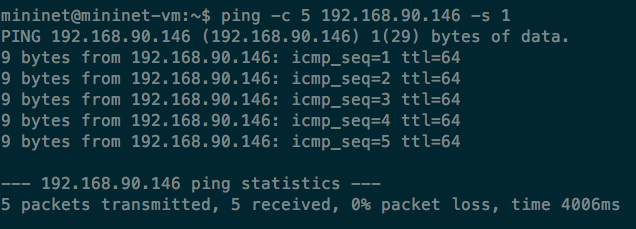
Obviously, ping in iputils doesn’t realize that the data is tampered!
Ping from MacOS with 1-byte payload:
MacOS ping seems to be more intelligent because it can detect the wrong data in reply.
Summary
In this article, we have answered the following questions:
- Can two
pingprocesses send two ICMP echo requests with same id at the same time?
Answer: No. When using ping provided by iputils, the id field in ICMP echo request is always the process id.
- If I write my own
pingwhich sends two ICMP echo requests with same id at the same time, how does Linux kernel delivers them to the right sockets?
Answer: Linux kernel identifies an ICMP echo message only by id and interface where it is sent/received. If two echo requests on the wire have the same id and is sent through the same interface, then the reply received first will be sent to the first sender, despite that it might be the reply to the second sender. It is the responsibility of user program to match other fields in the reply such as sequence number and payload.
- Can iputils
pingdetect an incorrect checksum?
Answer: No. But MacOS ping can.
- Can iputils
pingdetect an incorrect sequence number?
Answer: No. If ping sends an ICMP echo request with id = 1, seq = 1 but receives an echo reply with id = 1, seq = 2, it still counts it as the reply of the request. MacOS ping has the same behavior as long as the checksum is correct.
- Can iputils
pingdetect an incorrect payload?
Answer: No. But MacOS ping can.
Reference
[1] RFC 792 INTERNET CONTROL MESSAGE PROTOCOL
[2] Linux Source Code

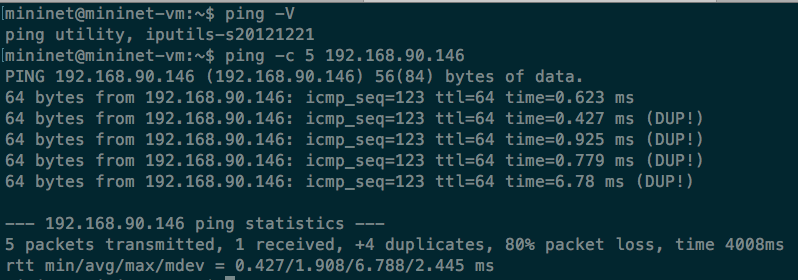
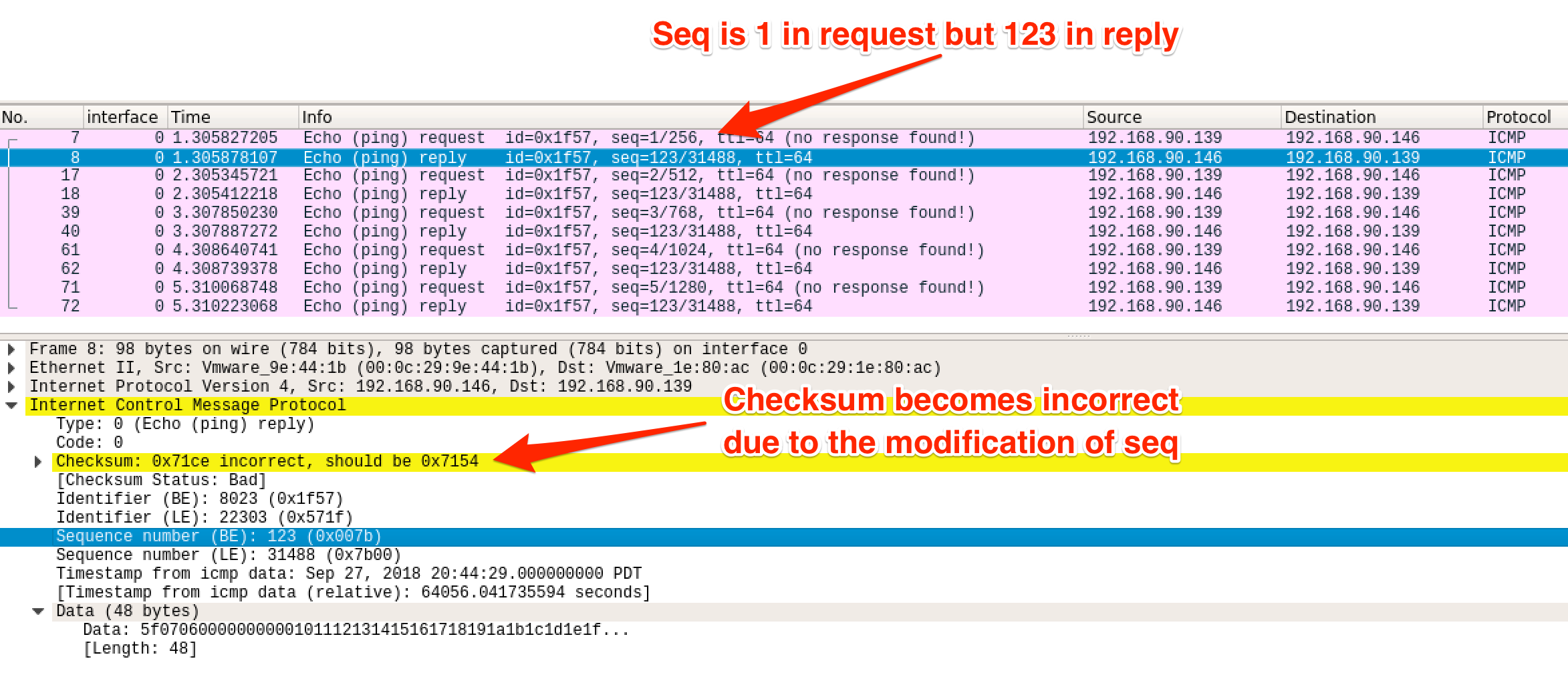
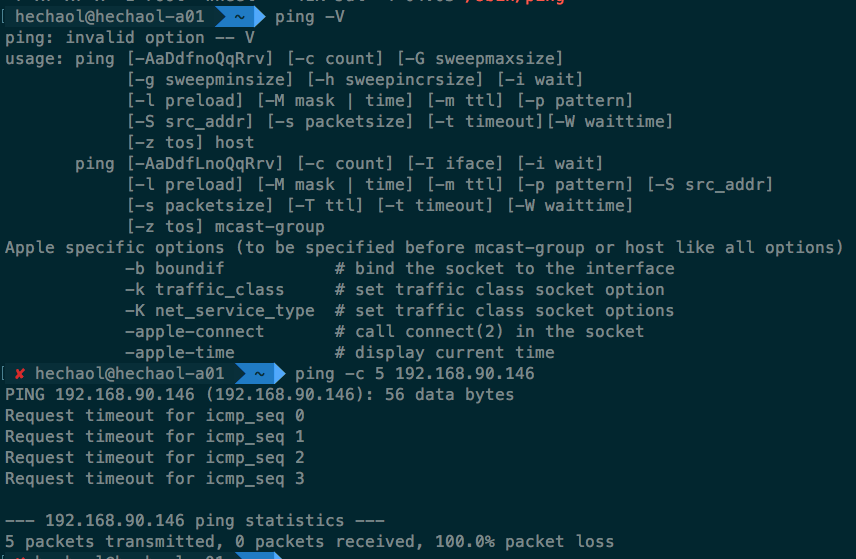
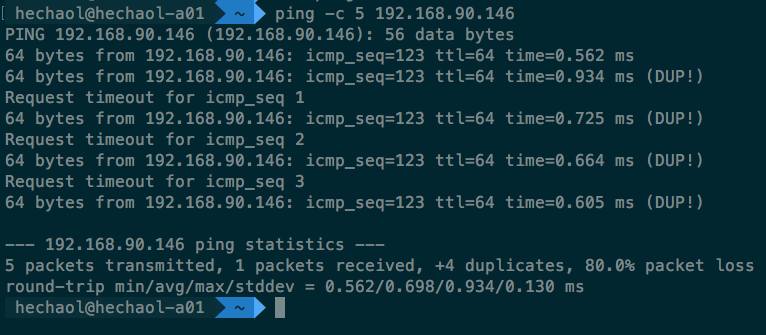

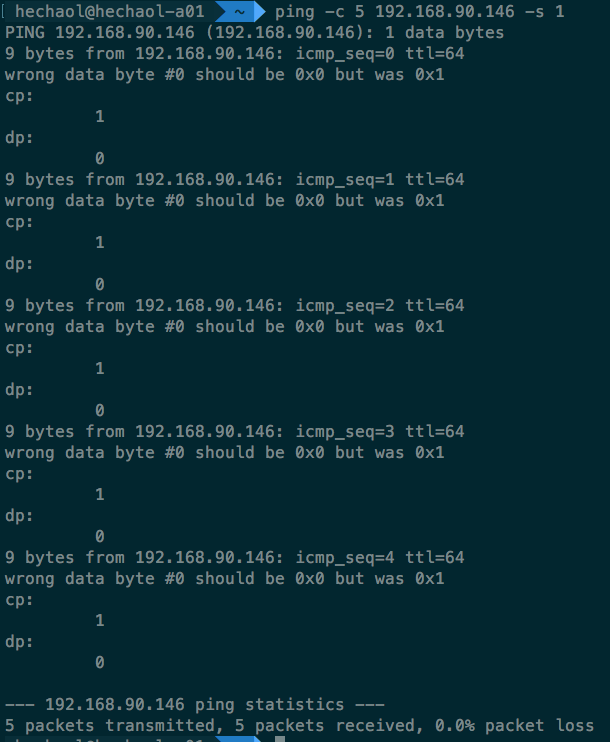
Comments powered by Disqus.